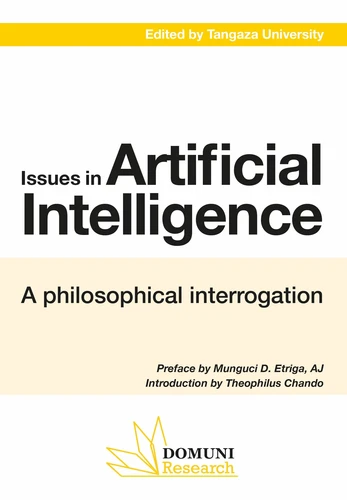Nouveauté
Issues in Artificial Intelligence: A philosophical Interrogation. Conference Proceedings III from Tangaza University
Par :Formats :
Disponible dans votre compte client Decitre ou Furet du Nord dès validation de votre commande. Le format Multi-format est :
- Pour les liseuses autres que Vivlio, vous devez utiliser le logiciel Adobe Digital Edition. Non compatible avec la lecture sur les liseuses Kindle, Remarkable et Sony
 , qui est-ce ?
, qui est-ce ?Notre partenaire de plateforme de lecture numérique où vous retrouverez l'ensemble de vos ebooks gratuitement
Pour en savoir plus sur nos ebooks, consultez notre aide en ligne ici
- Nombre de pages192
- FormatMulti-format
- ISBN978-2-36648-232-4
- EAN9782366482324
- Date de parution18/07/2025
- Protection num.NC
- Infos supplémentairesMulti-format incluant ePub avec ...
- ÉditeurDomuni-Press
Résumé
Issues in Artificial Intelligence: A Philosophical Interrogation delves into the fundamental philosophical questions raised by artificial intelligence. Originating from the third International Philosophy Conference at Tangaza University, this volume gathers scholars and thinkers who critically examine AI's impact on knowledge, ethics, and human identity. From the logic and language roots of AI systems to the moral limits of machine autonomy, the book explores whether machines can truly « understand » or be called intelligent.
It interrogates the growing tension between human and artificial intelligence and questions the very notion of an « artificial person. » Edited by Dr. Theophilus Chando, with a foreword by Munguci D. Etriga, this work is essential reading for anyone reflecting on the future of technology and what it means to be human.
It interrogates the growing tension between human and artificial intelligence and questions the very notion of an « artificial person. » Edited by Dr. Theophilus Chando, with a foreword by Munguci D. Etriga, this work is essential reading for anyone reflecting on the future of technology and what it means to be human.
Issues in Artificial Intelligence: A Philosophical Interrogation delves into the fundamental philosophical questions raised by artificial intelligence. Originating from the third International Philosophy Conference at Tangaza University, this volume gathers scholars and thinkers who critically examine AI's impact on knowledge, ethics, and human identity. From the logic and language roots of AI systems to the moral limits of machine autonomy, the book explores whether machines can truly « understand » or be called intelligent.
It interrogates the growing tension between human and artificial intelligence and questions the very notion of an « artificial person. » Edited by Dr. Theophilus Chando, with a foreword by Munguci D. Etriga, this work is essential reading for anyone reflecting on the future of technology and what it means to be human.
It interrogates the growing tension between human and artificial intelligence and questions the very notion of an « artificial person. » Edited by Dr. Theophilus Chando, with a foreword by Munguci D. Etriga, this work is essential reading for anyone reflecting on the future of technology and what it means to be human.



